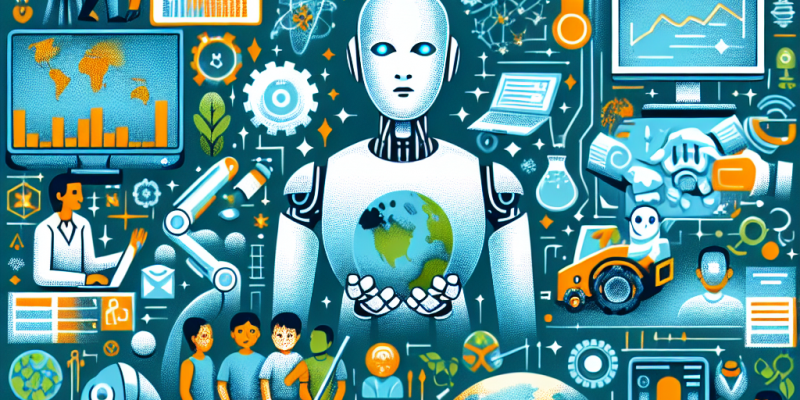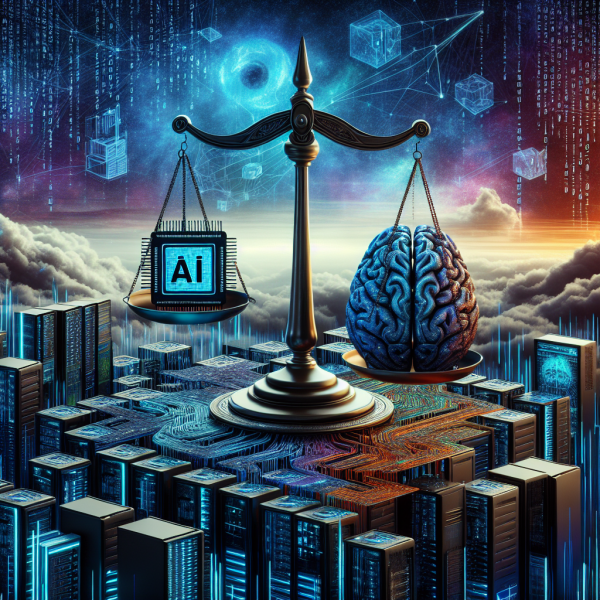AI for Good: How Technology is Tackling Global Challenges in 2024

AI for Good: How Technology is Tackling Global Challenges in 2024
In the rapidly evolving landscape of technology, artificial intelligence (AI) stands out as a transformative force, shaping how we navigate a multitude of challenges. As we step into 2024, the integration of AI across various sectors is not just a talking point; it is a commitment to addressing some of the world’s most pressing issues. From climate change and health pandemics to poverty and education, AI is proving to be an invaluable ally in the global quest for sustainable solutions.
Addressing Climate Change
Climate change remains one of the most significant threats to global stability and human existence. In 2024, AI-driven technologies are playing a pivotal role in mitigating its impacts. Machine learning algorithms analyze vast datasets to predict weather patterns, assess the health of ecosystems, and optimize energy consumption.
These AI models can assess environmental risks, guide reforestation efforts, and improve energy efficiency in buildings and manufacturing processes. For instance, AI is used to manage smart grids that intelligently distribute electricity based on real-time consumption patterns, thus minimizing waste and promoting the use of renewable sources.
Revolutionizing Healthcare
The healthcare sector has witnessed a remarkable transformation with the integration of AI, especially following the global pandemic. In 2024, AI systems are enhancing diagnostic accuracy, personalizing treatment plans, and streamlining hospital operations.
Machine learning algorithms are deployed to analyze medical images, detect anomalies in radiographs, and predict patient outcomes. Furthermore, AI is instrumental in drug discovery, speeding up the research process significantly compared to traditional methods. For example, AI can analyze databases of existing drugs, simulate interactions, and identify potential candidates for repurposing, potentially saving years in research and billions in costs.
Combating Hunger and Promoting Sustainable Agriculture
With the global population projected to reach nearly 10 billion by 2050, food security is an urgent concern. AI is providing innovative solutions to this challenge by enabling precision agriculture. In 2024, farmers are leveraging AI tools that analyze soil health, weather conditions, and crop performance to optimize yields.
For instance, drones equipped with AI technology are being used to monitor crop health, detect diseases early, and apply fertilizers or pesticides more efficiently. This not only increases productivity but also reduces environmental impact, contributing to sustainable agricultural practices that are crucial for feeding a growing population.
Enhancing Education
Education is another area where AI is making significant strides. In 2024, AI-powered platforms are personalizing learning experiences for students worldwide. These systems assess individual learning styles, strengths, and weaknesses, adjusting curricula to meet diverse needs.
Moreover, AI facilitates access to quality education in remote areas through online platforms and virtual classrooms. Language processing tools break down language barriers, enabling learners from different backgrounds to access resources and interact in real time. This democratization of education is crucial in providing opportunities to marginalized communities and fostering a more educated global citizenry.
Promoting Social Justice
Artificial intelligence is also being deployed to tackle social justice issues by analyzing patterns of inequality and discrimination. In 2024, AI tools assist organizations in monitoring human rights abuses by processing vast volumes of data from social media, news articles, and reports to identify and track incidents globally.
Furthermore, AI is helping to enhance transparency in governance. Predictive analytics can uncover patterns in public spending, helping NGOs and citizens hold governments accountable, thus promoting better governance and reducing corruption.
Conclusion
As we navigate the complexities of 2024, the role of AI in addressing global challenges has never been more critical. The synergy between technology and human ingenuity is paving the way for innovative solutions that are not just efficient but also equitable and sustainable. While there are valid concerns regarding ethics and governance in AI, the potential for technology to be a force for good is immense.
The commitment to leveraging AI for positive social impact reflects a growing understanding that technology should serve humanity, not the other way around. Through collaboration between governments, businesses, and non-profits, and with a focus on ethical considerations, we can harness the power of AI to foster a more sustainable, equitable, and prosperous world for all. The journey is just beginning, and the future looks promising.














